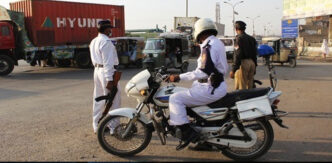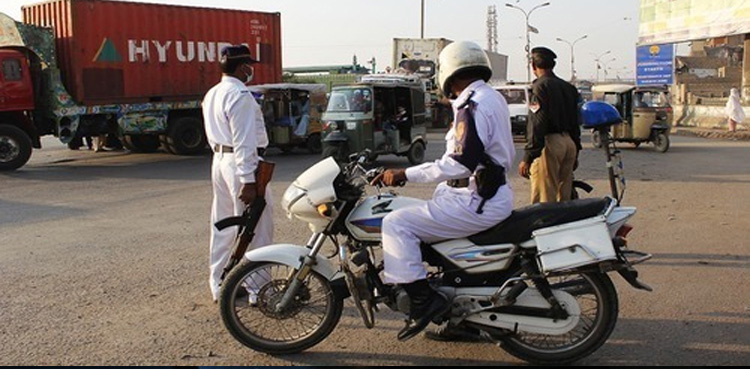In response to a sharp rise in traffic fatalities and accidents involving motorcycles and heavy vehicles, the Karachi Traffic Police, under the leadership of DIG Traffic Peer Muhammad Shah, has issued stringent directives aimed at enhancing road safety. These orders specifically target mills, factories, industries, and other organizations, emphasizing their responsibility to ensure compliance with traffic rules among employees. Below is a detailed overview of the new measures and their implications:
🚨 1. Mandatory Safety Measures for Motorcycles
Organizations must ensure that all employees riding motorcycles adhere to the following requirements:
Helmet Use: Riders must wear helmets at all times .
Valid Documentation: A valid driving license must be carried during rides .
Vehicle Fitness: Motorcycles must have functional headlights, tail lights, indicators, chain covers, and side mirrors .
Number Plates: Only Excise-approved, legally compliant number plates are allowed .
⚖️ 2. Strict Enforcement and Penalties
E-Challan System: A faceless, automated e-ticketing system has been implemented. Violations recorded via cameras result in fines linked to the rider’s CNIC. Penalties include:
50% discount if paid within 14 days.
Double fine after 21 days.
Driving license suspension after 3 months.
CNIC blockage after 6 months .
Field Monitoring: Senior officers (SOs and DSPs) are required to conduct field visits to ensure compliance and report on enforcement progress .
Vehicle Impoundment: Motorcycles without helmets or valid licenses will be impounded and released only upon proof of compliance .
🚛 3. Regulations for Heavy Vehicles
Movement Restrictions: Heavy vehicles (dumpers, trucks, water tankers) are banned from entering city limits during daytime (6:00 AM to 10:00 PM) and are restricted to specific routes like the Superhighway and National Highway .
Safety Upgrades: Mandatory installation of side railings, underrun bars, GPS trackers, dashcams, and rear-view cameras to prevent accidents .
Speed Limits: Heavy vehicles must adhere to a 30 km/h speed limit within the city. Violations incur fines of Rs. 2,000 (first time) and Rs. 4,000 (repeat offenses) .
Fitness Checks: Vehicles without fitness certificates will be impounded .
📊 4. Broader Traffic Management Initiatives
AI-Powered Enforcement: Automatic Number Plate Recognition (ANPR) cameras, speed cameras, and lane-monitoring systems are being deployed to detect violations like red-light running, speeding, and lane indiscipline .
Crackdown on Violations: Actions include:
Sealing shops selling illegal modifications (tinted glasses, fancy number plates).
Drug testing for drivers.
Registering FIRs for double/triple parking .
Infrastructure Improvements: Repair of highways, major roads, and underpasses to ease congestion, along with removal of encroachments .
📈 5. Context and Rationale
Rising Accidents: In the first seven months of 2025, 546 people died in traffic accidents in Karachi, with 8,136 injured. Heavy vehicles were responsible for 165 deaths, including 62 by trailers and 37 by water tankers .
Behavioral Issues: A study revealed that 98% of drivers in Sindh lack understanding of traffic rules, often refusing to give way or wear helmets due to misconceptions (e.g., “ruining hairstyles”) .
Economic Impact: Accidents disproportionately affect motorcyclists (55% of victims) and pedestrians (32%), many of whom are sole breadwinners,







